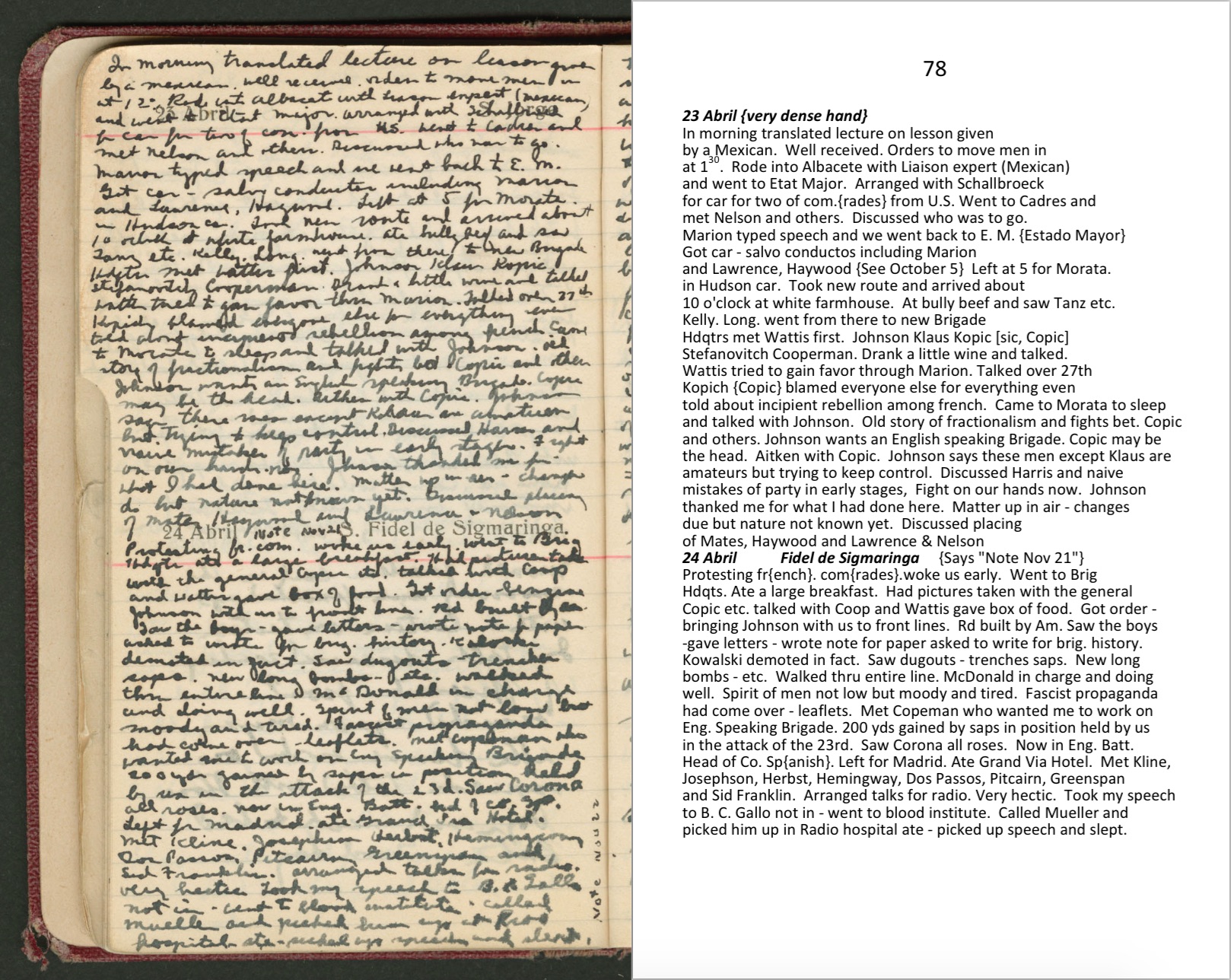
This diary page is intense in content and dense in hand. Bob Merriman had quite a lot to record for posterity. There are actually four diary pages devoted to these dates and he used pages from October and November to record them.
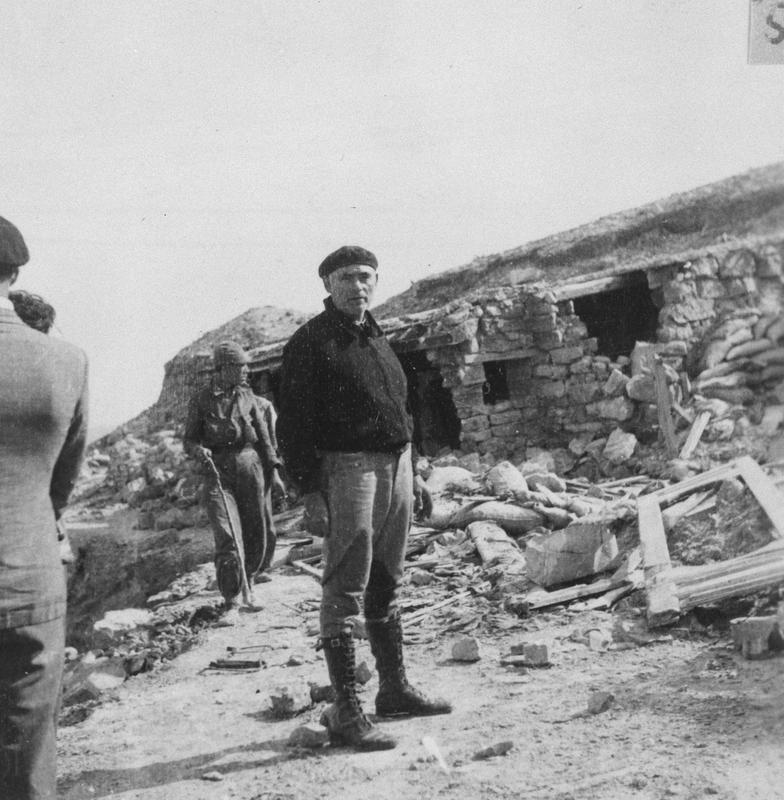

Merriman lets us know that the training period of the prior week has ended and he has orders to send the men into Albacete. This usually was a prelude to moving men to the front. Merriman hitches a ride into Albacete with a Russian, perhaps the same one who was involved in giving lessons to the troops. The “Liaison” expert is unnamed and would probably be a Comintern representative in Albacete. Important American Comrades have arrived and Merriman lands a car for them. On the 13th of April, Robert Minor arrived in France and the timing would be right for this important party official to make it to Albacete. It is likely that he was one of the two Americans who was given the car by Jean Schalbroeck. Schalbroeck is variously spelled Schallrock and Schallroch by Merriman but we believe this is the Belgian officer.
The second name in this paragraph who will be discussed extensively over the next few months is Steve Nelson, a CP organizer from Pittsburgh. Nelson and Joe Dallet were detained in Perpignan, France, when they tried to get into Spain and were released after serving about three weeks time there. Nelson was a well-liked and respected comrade in Spain and will rise to lead the Lincoln Battalion in his Commissar role in July when Oliver Law, the Lincoln Commander fell in action.
Merriman says that they “discussed who was to go”. This refers to who would go with the Merrimans to Madrid to deliver the radio address. While Marion finished typing his speech, it was decided that they would be accompanied by Bill Lawrence and Harry Haywood, first to Morata de Tajuña near Jarama and then on to the front lines. The “salvo conductos” were important enough that Merriman copied them into his diary on the October 5-9 pages:
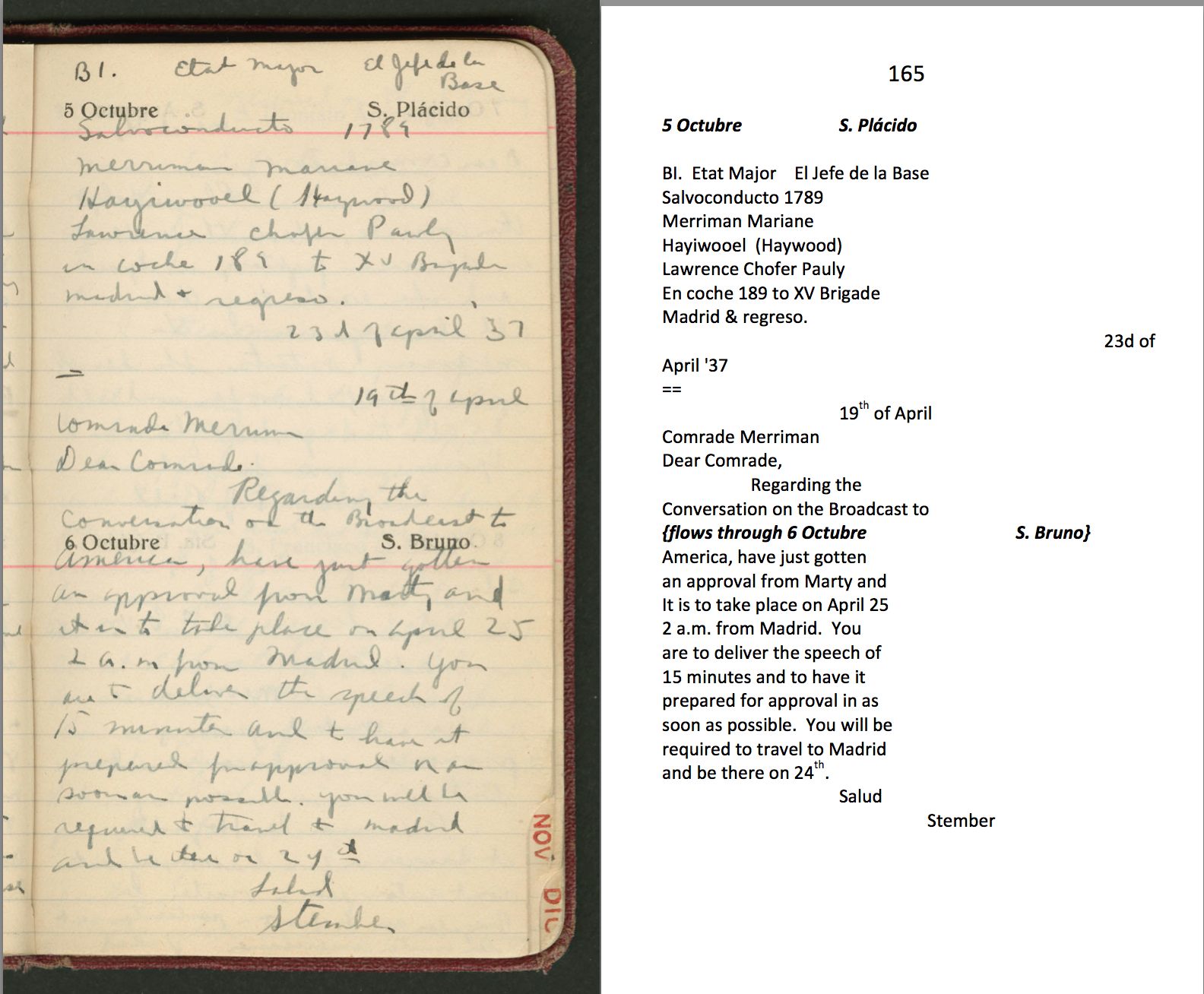
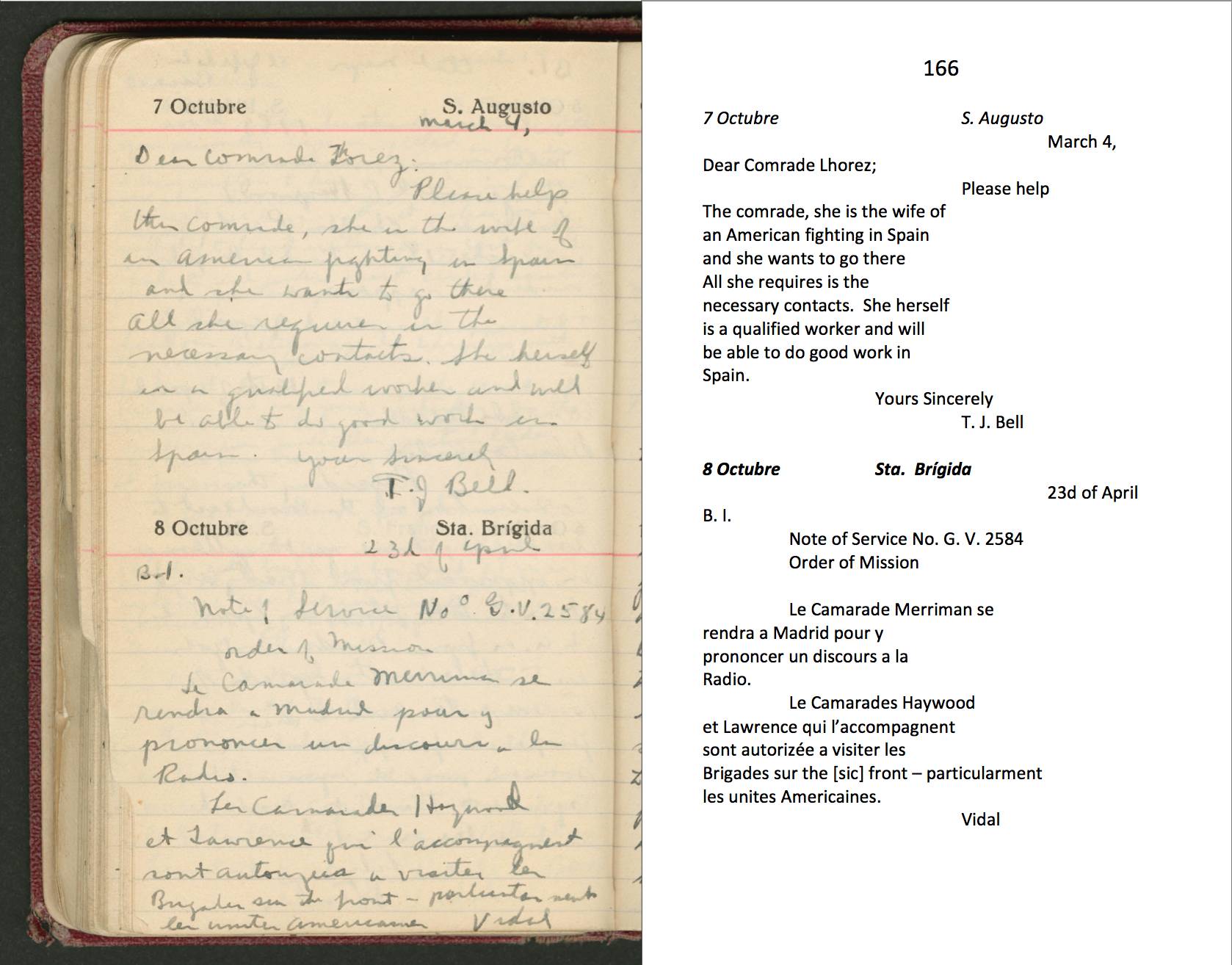

Merriman arrived late in the evening at the Estado Mayor in Morata and says he spoke with Al Tanz, Thomas Kelly, Patrick Long, George Wattis, Allan Johnston, Hans Klaus, Vladimir Copic, Stefanovich, and Phil Cooperman. Thomas Kelly was Section Leader of Company 1 of the Lincolns at Jarama. “Stefanovich” is believed to be Captain Vladomir Stefanovic, the Brigade chef du control des cadres.¹ Eby notes that Stefanovic was appointed the head of an ad-hoc committee to review George Wattis after the debacle of Jarama on the 27th of February and that Stefanovic was skilled in counter-espionage¹. Merriman did not take long to get embroiled in the politics of the Brigade. He again argued with Copic of the responsibility of the February 27 attack at Jarama. Merriman later admits in an additional note below, however, that some of the men did not like him. Allan Johnson, who did have considerable military experience, makes the comment that all the leaders are “amateurs”, except for Hans Klaus. Klaus and Copic would go at each other hammer and tongs until summer when Klaus was removed. Copic is rumored to become the leader of the new “English Speaking Brigade”. Merriman says that British Commander George Aitken supports Copic to be leader. Aitken was generally a thoughtful leader. In May, a letter from Dr. Langer and Aitken makes a plea for funds to pay for the tombs of men killed at Jarama.² This in-fighting will bubble for two more months and, in June, the Lincolns will try to remove Copic as head of the XVth Brigade. Haywood, Mates, Johnson and Nelson would lead the effort to replace Copic and they would not be successful. Tellingly, Merriman would not be amongst those who called for Copic to go, although there was never a good relationship between the two leaders. We will return to this story in June.
The flavor of the jockeying for position in the command structure could not be more clearly stated than in Merriman’s quote from April 24, below: “Political fencing of higher command sickening, much careerism”.
It is interesting that Merriman says that Allan Johnson thanked him for what he did in Jarama. Johnson will later go on to write a series of five articles on military techniques for the Volunteer for Liberty newspaper which was distributed to the troops in late 1937 and 1938. Militarily, Johnson may have been the best trained of the Lincolns, being a veteran of World War I, a graduate of the US Military War College and previously having held the rank of Captain in the U.S. Army.¹ Merriman and Johnson discussed the placement of the new comrades: David Mates, Nelson, Haywood and Lawrence.
April 23 was so busy that Merriman added a complete additional page on the November 21-22 unused pages of his diary:

Lieutenant Zaret is Daniel Abraham Zaretsky (aka Daniel A. Jarrett, Zorat, Jarrat), who was the Aide-de-Camp to Copic. Zaret is described in Cecil Eby’s Comrades and Commissars as being General Gal’s translator so he must have spoken Russian. Zaret was a NY Court reporter. Merriman discusses with him an idea of Gallo’s that the rotation of American troops out of the line could happen as soon as the new Washington Battalion in XVth Brigade can be formed. Zaret informs Merriman that Gallo is aware of what Merriman is doing at the Pozo Rubio Officer Training School and that his work is well regarded. Merriman is obviously pushing to get back into action but is told that Vidal wants him to wait another month to heal from his wounding at Jarama. He and Merriman discuss a Republican attack on an ammunition factory of the Rebels in Toledo which was destroyed by an artillery assault.
Returning to the main diary above, April 24 begins with Merriman being awoken during the night by protests from the French comrades who were “in revolt” according to Copic. Merriman says he had his photo taken with General Gal and Copic. This specific picture with the three of them has not been found in the Tamiment collection. Merriman says that he, along with Johnson, went to the trenches on the front lines of Jarama to meet with the men and bring them letters. The conditions at Jarama were improved somewhat since he was taken out wounded on the 27th of February. The sappers had moved the trenches forward about 200 yards and they had built a new road. This came at a cost, however. On April 5, the Garabaldi and Dombrowski battalions had driven forward to gain this 200 yards. Marty Hourihan ordered the Americans over the top to support the other battalions. The attack stalled when the Garabaldis got tangled up in the Lincoln’s barbed wire and had to pull back. 20 Americans were injured in the attack including Hourihan, Allan Johnson, and David Jones. Johnson must have been lightly wounded since he was back at Jarama by the 16th of April and accompanied Merriman there on the 23rd.³
Bob Merriman’s wife Marion Merriman Wachtel relates:
As we stepped from the car, we heard the solitary crack of rifle fire. We walked thorough the dugout trenches. I felt skittish, for the explosive bullets made a nasty crack as they sailed through the air and buried themselves with a thud in the earth. The men in the trenches gathered around Bob, and we all talked amid the zinging and cracking of the rifle fire. I was impressed by how deeply dug the trenches were, how clean and dry they were, and how high the sandbags were piled for safety. But I was jumpy. The bullets sang overhead. I followed orders about keeping my head down.
Bob moved easily among the men and you could see their respect for him. Inwardly, however, I knew he felt a little uncomfortable. He felts sorry for the men who had been at the front so long, almost seventy days by then. A sense of loneliness came over Bob when he realized how many of the men he had fought with were not there. Killed. Or wounded.
But Bob was cheered by the warmth shown him by American replacements, who had heard of his loyalty to his men at Jarama and knew of his own wounding on February 27.
In one place, the trench was within thirty-five meters of the enemy. The Americans looked tired. But I thought their morale was good. “Those bastards couldn’t hit a barn with a cow”, one said to Bob as the Fascist artillery rumbled to life and the shells went astray, crashing into the earth a good distance from where we huddled in the trench.4


Merriman notes that a “Kalosky” had been demoted. This is probably Walter Kolowski, who had gone in with the first group in December 1936. Kolowski had been promoted to be head of the Machine Gun Company on the 16th of April³ and this note says that he was demoted back by the 23th. Kolowski must have returned to the US from Spain in 1937 since he returned again in May 1938 along with a group of six other Americans who had been home for some time in 1938. Kolowski finally left Spain on the SS Ausonia in December 1938 with a large number of American repatriates. Merriman mentions meeting Fred Copeman who was a Commissar in the British Battalion at Jarama. He also notes that Arturo Corona is now “currying favor” with Merriman. He comments in the continuation page from the November 21 page of the diary that 42 new Internationals have now arrived at Madrigueras. Included in that group were Dave “Mooch” Engels and Canadian Bob Kerr. Bob Kerr would become the record keeper for all Canadians in Spain, make assignments of Canadian personnel to various units, and served in the Cadres service5.
Later in the day, the Merrimans are off to Madrid to deliver their speech to the radio broadcast back to America. Merriman meets Dr. William Pike, head of the Battalion Medical Services, and Marty Hourihan in Madrid. Drafting the speech was done mostly at the last minute. Merriman was only one of six people speaking including segments of songs from Spain by a German exile named Ernst Busch. The songs of Ernst Busch are now available on CD from Smithsonian Folkways. George Marion (“Marion Greenspan”) who was a newspaper writer, locked horns with Haywood and Lawrence on the text of the speech.
Merriman was in lofty company in preparing for his speech. He met cinematographer/radio announcer Herbert Kline, Matthew Josephson, Josephine Herbst, Ernest Hemingway, John Dos Passos, Pitcairn (Francis Claude Cockburn), Marion Greenspan and Sid Franklin (“the Brooklyn bullfighter” according to Hemingway). Sid Franklin “served as chaperone” to Martha Gellhorn, according to a new book by Amanda Vaill6 on Hemingway and others noted in this diary. A film made about this time shows a fabulous line up of important names in the Spanish Civil War and Harry Randall apparently captured a still of the group.
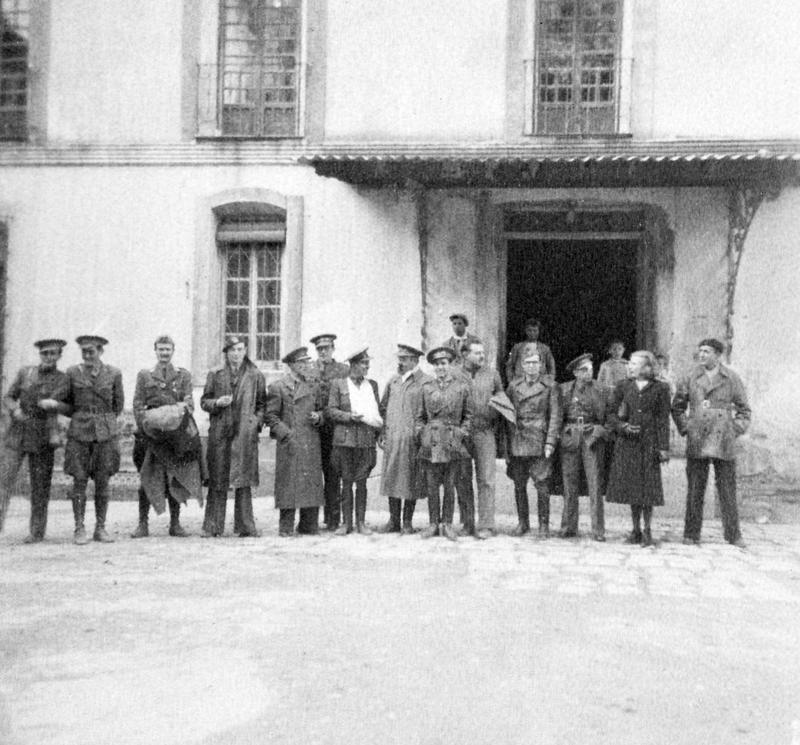
Merriman makes the following notation on the November 27 page of the diary:
On Monday’s program 2 am 25th was Kline – Sid Franklin bullfighter (helping Hemingway on NaNa) who was the announcer. I spoke first. Pike second. speech by Dos Pasos {Passos} read third Josephine Herbst and Hourihan Bush sang in general fine program. Pleased with Hemingway – disappointed in Dos Pasos
Apparently none of them could stop Ernest Hemingway from modifying the text and making it more “dramatic” than Merriman was comfortable with.
__________________________________
¹ Eby, Comrades and Commissars, ibid, pg 87, pg 160.
² Aitken_plea for funds, Moscow Comintern Archives, Tamiment Library, NYU.
³ Landis, Abraham Lincoln Brigade, ibid, pg 161.
4 Marion Merriman Wachtel and Warren Lerude, American Commander in Spain, ibid., pp 129-130.
5 Michael Petrou, Renegades: Canadians in the Spanish Civil War, UBC Press, Vancouver, p. 12.
6 Amanda Vaill, Hotel Florida: Truth, Love, and Death in the Spanish Civil War, Ferrar, Straus and Giroux, New York, New York, 2014.
